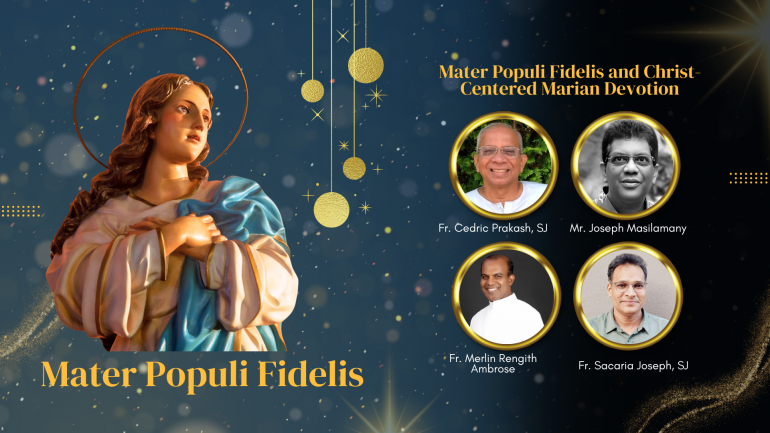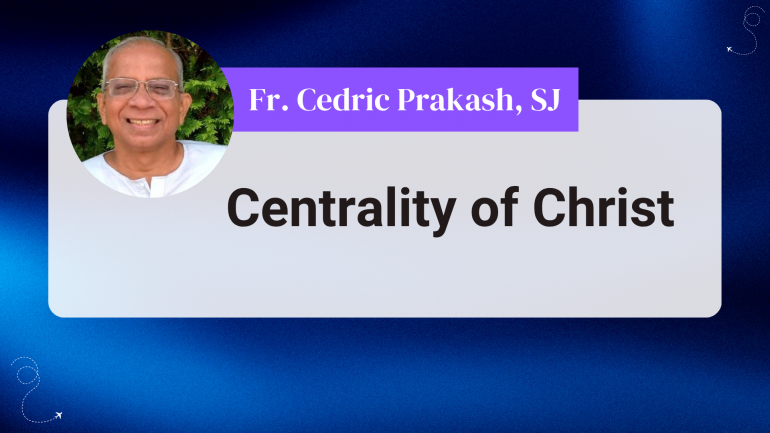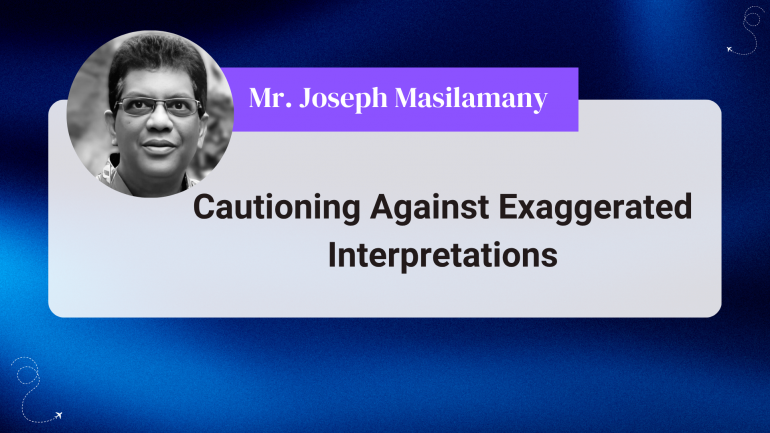Experts Weigh In on Mater Populi Fidelis and Christ-Centered Marian Devotion

The Dicastery for the Doctrine of the Faith (DDF) released a new doctrinal document on November 4, titled Mater Populi Fidelis (“The Mother of the Faithful People”), clarifying the proper understanding of certain Marian titles in relation to the mystery of salvation. Some of the popular titles addressed in the Note include Co-Redemptrix, Mediatrix, and Mediatrix of All Graces.
Radio Veritas Asia reached out to experts, both lay and religious, to understand their perspectives on the Note’s clarifications.

Centrality of Christ - Fr. Cedric Prakash, SJ
(Fr. Cedric Prakash, SJ, an Indian Jesuit, is a human rights, reconciliation, environmental, and peace activist and writer.)
Mater Populi Fidelis is, without doubt, the result of a long and complex collegial effort. The 20-page, 80-paragraph Note provides a significant biblical foundation for devotion to Mary, drawing from the Fathers, the Doctors of the Church, elements of Eastern tradition, and the reflections of several Popes.
The Note encourages Marian devotions and titles such as Mother of Believers, Mother of the Faithful, and Spiritual Mother, which highlight Mary’s maternal care in the order of grace, her intercession, and her exemplary discipleship. However, it strongly discourages the use of titles like Co-Redemptrix and Mediatrix, providing sound theological reasons for why they should not be applied to Mary.
Even during the Eucharistic celebration, Marian devotions sometimes risk overshadowing Christ. The timely Note, while extolling Mary’s undisputed role as “Mother,” also asserts that one cannot place Mary on par with Jesus. Our faith remains Christocentric. Mary leads us to Jesus, and any attempt to “deify” her is not consistent with Catholic teaching.

Orientation Toward Christ - Fr. Merlin Rengith Ambrose
(Fr. Merlin Rengith Ambrose is a Professor of Canon Law at St. Peter’s Pontifical Seminary, Bengaluru. He also serves as the Executive Secretary of the Commission for Canon Law of the Conference of Catholic Bishops of India.)
The doctrinal Note fundamentally reaffirms Catholic teaching, which consistently underscores that all aspects of Mary’s identity and role are oriented toward Christ and His salvific work. Regarding the title Co-Redemptrix, the Note concludes that it is always inappropriate to define Mary’s cooperation with this term. The title risks obscuring Christ’s unique salvific mediation and can create confusion, disrupting the harmony of Christian faith.
On the title Mediatrix, the Note emphasizes that “the biblical statement about Christ’s exclusive mediation is conclusive. Christ is the only Mediator.” While mediation in everyday life may imply cooperation, assistance, or intercession, applying it to Mary must always remain subordinate to Christ.
The title Mediatrix of All Graces risks “presenting Mary as the one who distributes spiritual goods or energies apart from our personal relationship with Jesus Christ.” Mary’s mediation should affirm that it “neither takes away from nor adds to the dignity and efficacy of Christ, the one Mediator.”

Cautioning Against Exaggerated Interpretations - Mr. Joseph Masilamany
(Joseph Masilamany, veteran Malaysian journalist and freelance writer, is an ardent devotee of Our Lady.)
The Dicastery for the Doctrine of the Faith’s recent Doctrinal Note, Mater Populi Fidelis, provides a timely clarification on Marian titles, reaffirming the Church’s careful balance between devotion to Mary and the centrality of Christ in salvation. By distinguishing between acceptable titles such as Mother of Believers and Spiritual Mother and those considered problematic, notably Co-Redemptrix, the document safeguards the faithful from theological misunderstandings that could obscure Christ’s unique role as the sole Mediator.
The Note also addresses the nuanced use of Mediatrix and Mediatrix of All Graces. It acknowledges Mary’s subordinate, maternal cooperation in God’s work, emphasizing that any mediatory role she holds is fully dependent on and directed toward Christ. This precision protects the faithful from the misconception that Mary could operate independently of Him while still affirming her profound participation in salvation history.
Importantly, Mater Populi Fidelis reflects pastoral sensitivity: it recognizes the richness of popular devotion while cautioning against interpretations that exaggerate Mary’s role or introduce ambiguity. By grounding its guidance in Scripture, the Church Fathers, and Magisterial teaching, the Note offers clarity and reassurance to believers seeking to honor Mary without diminishing the primacy of Christ.
In a time when Marian devotion continues to flourish globally, this doctrinal guidance serves as a reminder that true veneration of Mary leads to deeper love for Christ. As the faithful reflect on her maternal care and intercessory help, they are invited to see her not as a rival mediator but as a guide drawing all hearts to God’s grace and mercy through Jesus Christ.

A Balanced Vision of Marian Piety - Fr. Sacaria Joseph, SJ
(Fr. Sacaria Joseph is an Indian Jesuit and author of several articles on Marian titles used in the Litany.)
Though many Marian titles are deeply rooted in Church tradition, their inaccurate use or theological misinterpretation can risk distorting core Catholic doctrines. Mater Populi Fidelis addresses the proper understanding of Marian titles connected to Mary’s participation in salvation.
The Note clarifies that Mary’s role in salvation is unique yet subordinate; she cooperates with, but never parallels, Christ, the one and only Redeemer (Acts 4:12). For this reason, Co-Redemptrix is considered theologically inadequate and potentially misleading.
Similarly, the title Mediatrix must always be understood as dependent upon and subordinate to Christ’s redemptive work, lest it detract from His exclusive role as the one Mediator between God and humanity (1 Tim 2:5). Regarding the devotional title Mediatrix of All Graces, the Note clarifies that only God, through Christ, can dispense grace universally (Col 1:19–20). Mary, as the first of the redeemed, cannot mediate the grace she has received. In a broader devotional sense, the plural term graces may refer to the many spiritual or temporal blessings believers receive through Mary’s intercession.
Ultimately, Mater Populi Fidelis reaffirms that Mary’s entire mission points toward Christ and His saving work. By offering theological clarity, the document invites the faithful to renew their Marian devotion with deeper understanding and fidelity to the Gospel. It safeguards the mystery of Christ’s unique mediation while honoring Mary’s singular cooperation in salvation history. In doing so, the Church upholds a balanced vision of Marian piety.
Let us know how you feel!
Comments
Wozu fühlte sich das jüdische Volk in besonderer Weise berufen?
Diese Frage des jüdischen Resonanzboden der katholischen Kirche ist bis heute nicht klar genug theologisch beantwortet worden
Wir kommen aber dieser Frage näher, wenn wir uns das Magnifikat der gerade schwanger gewordenen jüdischen Maria ansehen.
Sie macht in diesem Text eine Analyse der Gesellschaft, in der sie lebt und stellt fest, dass es da zu große UNGLEICHHEITEN zwischen den Reichen und Armen gibt.
Und sie stellt fest, dass dieser Zustand so nicht bleiben darf. Und deshalb geht sie davon aus, dass ihr VATER im Himmel, dessen Sohn sie zur Welt bringen wird, diese Ungerechtigkeiten beendet.
Sie sagt im Magnifikat nicht, durch wessen menschliche Hilfe GOTT dieses Unrecht den Armen gegenüber beendet, aber dass GOTT das tun wird, daran hat sie keinen Zweifel.
Sie war also ganz offensichtlich eine junge Frau, die erstens gesellschaftliche Probleme erkannt und benannt hatte und die sie auch transformiert sehen wollte.
Deshalb ist sehr stark an zu nehmen, dass sie JESUS auch in genau diesem Kontext bereit war, zu gebären.
Die Erlösung, die sie durch JESUS erwartete, umfasste also definitiv nicht ausschließlich eine individuelle Erlösung einzelner Menschen, sondern auch die Erlösung von gesellschaftlichen Übeln, wie Ausbeutung und Unterdrückung von Hungernden.
Was also wollte MARIA erlöst wissen???
Was hatte sie von ihrem Sohn, als dem Sohn GOTTES in diesem Kontext erhofft und erwartet?
Sie hatte JESUS nach meinem Verständnis in diesem Erlösungsprozess aktiv unterstützt und begleitet.
Sie ist aber nicht selbstzum Tode verurteilt worden, nicht ans Kreuz geschlagen worden und auch nicht voller Schmerzen am Kreuz gestorben.
Sie ist auch nicht auferstanden von den Toten und hat uns nicht den HEILIGEN GEIST geschickt.
Deshalb konnte sie nie gleichwertig neben JESUS als Miterlöserin bezeichnet werden.
Aber sie war laut Magnifikat weitaus MEHR daran interessiert, dass diese Welt vom Übel der Unterdrückung befreit wird, als ihr bisher durch katholische Theologen viel zu oft zugestanden worden ist.
In so fern ist das aktuelle Schreiben über die Frage der Miterlöserin Marias nett, aber mehr auch nicht. Das Schreiben aus dem Vatikan ist deshalb sogar ärgerlich banal.
Es geht weder in die nötige Tiefe, noch zeigt es tatsächlich auf, in welcher Weise wir Katholiken in der Zukunft Maria wirklich lieben, anerkennen und auch als unsere Mutter ansehen sollen.
Wir können das alles noch viel konkreter erklären.
Wir wollen aber nicht denn sonst müssten wir auch entsprechende TATEN folgen lassen.
Zum Beispiel die Umsetzung der Katholischen Soziallehre weltweit.
Gottes Segen aus Berlin von einer Religionswissenschaftlerin und Pädagogin mit jahrelanger beratender Berufserfahrungen in Entwicklungsprojekten in Indien und Bangladesch.
Our people should be guided well and taught better as to place in Mother Mary in the canvas of great act of Redemption.










- Reply
Permalink